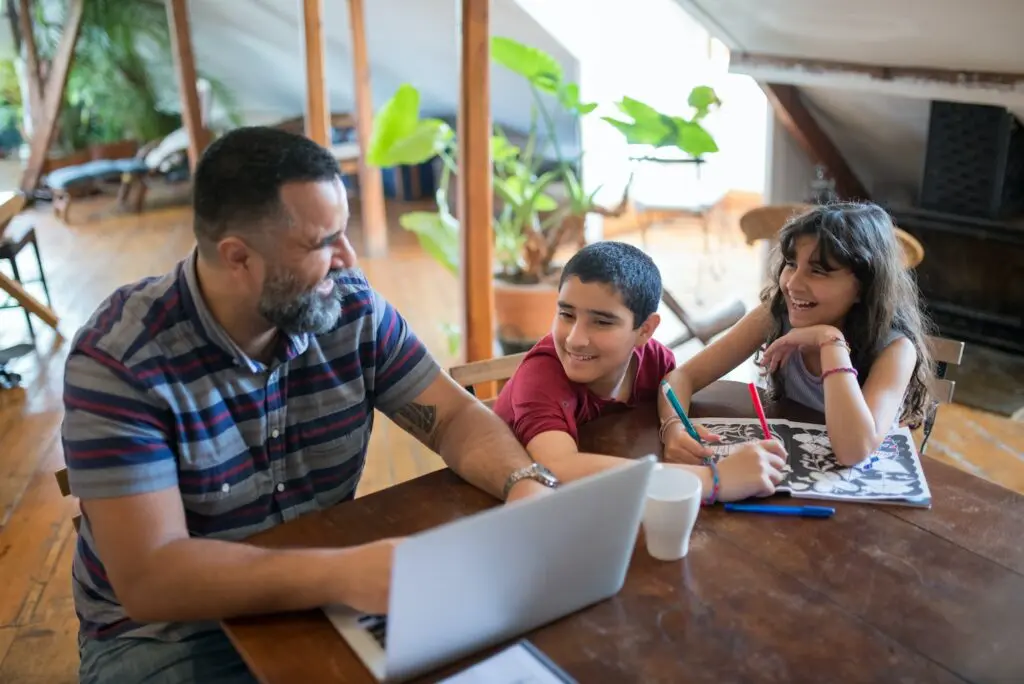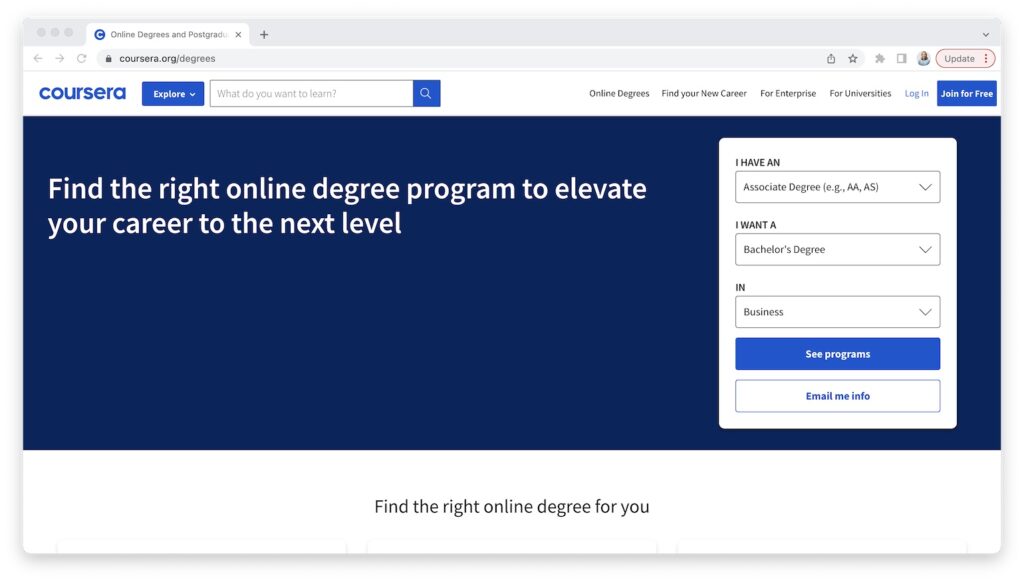These days, there are more options and routes into tech than there have ever been before, making it more and more accessible to everyone! 🎉
In addition to traditional computer science degrees, there are coding bootcamps, online courses, and online degree programs where you can earn a bachelor’s or even online masters degree!
If you want to get a degree, you may find that the benefits of online degree programs outweigh a traditional in-person experience. Students attending online classes get many of the same perks as traditional college enrollees, plus plenty of extra online college benefits!
Disclosure: I’m a proud affiliate for Coursera. If you sign up for a course through my links on this page, I may get a small commission for referring you. Thanks!
Is an online degree worth it for you? In this post, sponsored by Coursera, you’ll learn exactly what an online degree is, 11 advantages of online education vs in-person options, and some FAQs to help you answer: “Should I get an online degree?”
Let’s get started!
What Are Online Degrees?
Online degrees are associate’s, bachelor’s, and master’s degrees that you can earn 100% online—without ever stepping foot on a campus or in a classroom.
You can often learn from the same professors and graduate with a high-value credential from the same university as on-campus students!
When studying online, university students can take their classes from anywhere and still interact directly with professors and classmates.

Coursera hosts a wide variety of bachelor’s and online master degree programs, from universities like University of Pennsylvania, Arizona State University, University of Michigan, University of London, etc. If you’re in the process of choosing an online college, it’s definitely worth checking on Coursera.
When you join any of the online degree programs with Coursera, all degrees are issued directly by the university offering them. (Your diploma will look exactly the same as a person who went in-person!) 🎓
Start coding now
Stop waiting and start learning! Get my 10 tips on teaching yourself how to code.
☝️ Back to top
11 Benefits of Online Degrees vs Traditional College
Why do an online degree program? When you’re deciding whether to get a degree online or enroll at a physical university campus, here are some advantages of online education that may tip the scale in the favor of remote learning.
1. You don’t have to put your whole life on pause to study
In the past, studying for a new career or skill set meant quitting your job and intensely studying for a year or more. That kind of life change is very disruptive and difficult to do, especially financially.
With online degree programs, it doesn’t need to be such a big deal and doesn’t need to impact the rest of your life as much.
More flexibility in terms of classes and schedules means you can study alongside your existing job and other commitments. No commuting and more flexible class times means extra time savings.

Some self-paced online colleges might schedule their classes in the evening, so students can fit them in around other commitments.
👩🏻🎓 Patricia Ribiero Peña—a new mother with a full-time job—joined University of Illinois’ highly respected iMBA program through Coursera. “The concept of doing an MBA was a little scary,” says Peña. “I always imagined a block of two-to-three years I had to fulfill of nonstop studying, and then someone sent me a link with this new innovative program.”
2. Choose from a wider range of courses/universities without moving
Traditionally, you’d have to live near (or move to) a college in order to study there. That can work for young people fresh out of high school, but it’s much harder to uproot your life if you’re older with a job, a family, and other ties to your current home.
One of the huge benefits of online degree programs is that they allow you to get education from a well-respected university without having to live nearby!
How cool is it to be able to get a degree from HEC Paris or the University of London when you live in the US? Or get an online masters degree from an Ivy League school, when you live across the country?

👩🏻🎓 Xunjing Wu was drawn to The University of Pennsylvania’s Online Master of Computer and Information Technology degree, in part because of The University of Pennsylvania’s Ivy League status. Plus, so many alumni of the MCIT on-campus program had gone on to become software engineers at top companies such as Facebook, Google and Bloomberg after graduation.
She got in, and it didn’t matter that she lived in NYC—just another advantage of online classes through Coursera!
☝️ Back to top
3. Travel while you study: be a digital nomad
When you study in-person, you need to physically show up to classes, so you can’t disappear for a week to go to a friend’s wedding or spend a month immersing yourself in another culture.
With an online degree, you’re not tied to any particular location, so you can go anywhere at the same time as you get a degree online!
You could travel around the world, experience living in another country, and/or move to a cheaper place to save money (geoarbitrage). Lots of young entrepreneurs do this to build their businesses while living super cheaply in Bali, Chiang Mai, or other digital nomad hubs abroad.

👩🎓 Mattison Hineline lived in Málaga, Spain, teaching English. During the pandemic, she started taking programming classes online and began to think about the possibilities of a career in data science.
She determined that she wanted to earn her master’s, but was concerned about the challenges of relocating back to the US from Spain, so she began to look at online options. She ended up choosing the online master’s degree in data science from the University of Colorado Boulder on Coursera!
4. Work at your own pace and on your own schedule
How long does it take to get a bachelor’s degree online? In many ways, it’s up to you!
There are two main schedule-related benefits to getting your degree online:
- On a day-to-day level, classes may be easier to fit into your day because you don’t need to spend time traveling to class. Plus, because you can attend lectures from anywhere using just your phone or computer, you might be able to multitask by exercising or running errands at the same time. 💪
- On a more macro level, you might have more flexibility in terms of how quickly you complete your online degree program. Many online programs let you choose how many modules you take at a time, for example.

👨🏽🎓 Karim Makisig “Maki” Villano was interested in earning a master’s in data science, but as a single father living in the Philippines, he needed to find a program that would allow him to learn the necessary skills without uprooting his life, work, or family.
Once enrolled in the full master’s program, Maki was happy to find that the online format and in-course tools allowed him to process and absorb the material on his own time. He could absorb lectures while washing the dishes or folding laundry and rewatch videos until he fully understood each topic.
☝️ Back to top
5. Study from home in a comfortable environment
Particularly if you have a disability, mental health issues, or limited ability to commute, going to a campus to learn might be daunting or even impossible.
When you study online, you skip all the hassle and stress that comes with commuting, being in a busy space, etc. Online degrees make education more accessible, especially for people with different abilities, anxiety, or chronic health issues.
And for everyone else, it means you can show up in your pajamas!
The data even shows that students are often more comfortable in this type of setting / more likely to be successful:
- Nationwide, the average retention rate (students who return for sophomore year) is 78%.
- The 1st-year student retention rate is 92% for Coursera online degree programs.
Think about that—22% of traditional college freshmen drop out, but only 8% of first-year Coursera students don’t return!

6. Pay less than you would for a traditional degree
The thought of paying for university or taking on student loans can be daunting. Luckily, getting an online college degree vs traditional college degree generally comes with a much lower price tag!
In 2021, the annual total cost of attendance in the US was $15,748 for a two-year public college, $25,487 for a four-year public college or university, and $53,217 for a private non-profit institution. For a master’s degree, the average total cost was $66,340.
So, how much does an online degree cost? Coursera degrees range from ~$9,000 to $30,000+, so you can walk away with a comparatively affordable diploma. Online programs tend to be less expensive because they don’t have the same overhead as many in-person programs.
Plus, you also save money on the other side of the experience—you don’t have to commute, buy food on campus, upgrade your wardrobe, etc. You might also be able to save on childcare costs by studying from home.

On the flip side, there are some things you might need to pay for that you might not have to if you were on campus, like a printer, research database subscriptions, etc.
☝️ Back to top
7. Become part of an international and more diverse community of students
Online degrees are open to people all over the world, so cohorts are more likely to be more diverse. Coursera degree students hail from 95 countries! 🌎
Furthermore, the convenience means that online degree programs are more likely to attract older or less conventional students, so you’re likely to be studying with lots of different kinds of people. The average age of a Coursera online degree student is 35.

Through studying online at university programs on Coursera, you can make friends and connect with all kinds of people, expand your understanding of the world, etc.
👩🏻🎓 Xunjing Wu, who we met earlier, says, “I am grateful for the MCIT online community. The diversity in professional and cultural backgrounds—and the willingness and openness of the students to connect and support one another—is truly amazing. Thanks to this wonderful community, I have expanded my career network, and most importantly, made good friends.”
8. Improve and demonstrate additional skills
When you study remotely, you have to become comfortable with technology (to participate in video calls, collaborative projects, etc).
Plus, you have to develop soft skills (clear communication, time management, proactive, independent research, and so forth).

These skills in themselves can be super helpful, particularly in a world where more and more jobs are remote. Your degree will be evidence to potential employers that you have these skills. You can also reference your online degree experiences during interviews to show why you could be a capable work-from-home employee!
☝️ Back to top
9. You may be able to enroll with fewer pre-qualifications
Is it easier to be accepted in an online degree vs a traditional college? It can be! Some Coursera degrees let you prove your skills instead of requiring particular qualifications, so it might be easier to get accepted to an online degree vs traditional.

👨🏽🎓 Karim Makisig “Maki” Villano wanted to do the Master of Science in Data Science from the University of Colorado Boulder
He enrolled in a Pathway Specialization, a 3-course series focusing on either statistics or computer science. By completing all three courses in one pathway with a cumulative 3.0 GPA or better, you’re immediately admitted to the program.
10. Get started sooner
The application process can be quicker, and online degree programs may be offered with more frequent start times, so you don’t have to wait ages for your course to start.

You can even take some of the university’s Coursera courses individually before even applying to get a degree online. If you get accepted, that prior work will count towards your degree! Karim took advantage of this:
“In other programs, I would have waited months to hear back about my admission. With CU Boulder, I could jump right in and not waste any time.”
11. It’s cool!
Okay, any kind of education is cool in my book… But seriously, earning an online computer science degree, or online web development degree, or any kind of tech/programming degree online… it’s just modern, different, and interesting! 😎
It gives you something to talk about at parties or meetups and makes you stand out a bit. People will be curious about how it works and what your experience was like. It might even inspire them to think about their own career goals and follow their dreams!

☝️ Back to top
FAQs About Online Degree Programs
Got some questions before you decide to figure out how to get a bachelor’s degree online to meet your goals (or earn an online master’s degree)? These answers may help!
Start coding now
Stop waiting and start learning! Get my 10 tips on teaching yourself how to code.
💼 Do employers see online degrees in the same way as regular ones?
Is an online degree the same as a regular degree in the eyes of prospective employers?
Yes! Many online degrees give you diplomas that do not even indicate whether the degree was earned online or on-campus. On Coursera, for example, they are accredited by the university offering them. This means employers won’t know the difference.
And even if the employer does know you earned it online: as many as 83% of business leaders see an online degree at a “well-known” institution as having the same value as an on-campus degree. So either way, you’ll be fine!
🕺 Won’t I miss out on the in-person campus life stuff?
You might think getting an online degree will make you miss out on networking and the “full” college experience.
However, many online degree programs offer opportunities to interact with other students: discussion forums, emails, video chat, instant messenger (Slack), group projects, live sessions, virtual study groups, etc.

You may not get the “full” college experience, but you’ll still have plenty of opportunities for networking, socializing, getting to know new people, etc. Depending on your priorities, the other benefits of an online degree may well outweigh missing the social side of the college experience.
There are also advantages of online education for older students who are beyond the time when college parties sound appealing anyway!
💰 Can I still get financial aid?
Yes! You can still get financial aid when getting your degree online. FAFSA is an option if you are eligible. Just make sure the online degree program you’re taking is accredited otherwise you may not qualify for financial aid.
Scholarships and grants, private loans, pay as you go, etc. may also be available.
Other options for financial aid for an online degree: See here
🗓️ How long does it take to get a degree online?
It depends on the type of degree – e.g., which online university you’re studying with, whether your degree is bachelors vs masters, and the specific program you’re in.
Generally, you can expect it to take the same amount of time it would take to earn a degree on campus. However, you can condense your studies or space them out so you can either be done faster or take your time.
For example the Bachelor of Science in Computer Science from Coursera can take anywhere from 3-6 years to complete. The Master of Science in Data Science takes two years.
Overall, you can expect to dedicate 2-6 years to earning an online degree. (But remember: during those years, you shouldn’t have to put your life on hold thanks to the advantages of online classes!)

💵 How much does an online degree cost?
Usually, students pursuing an online bachelor’s degree spend an average of $51,091 total.
By comparison, Coursera online degrees range from ~$9,000 to $30,000+. Since Coursera online degree programs still earn you a real degree from a real university, it’s a no-brainer to enroll through them if you find a program you like.
☝️ Back to top
Conclusion: Is An Online Degree Worth It?
Only you can decide if an online degree is worth it for you in the end! But here are some questions to think about to help you decide:
- Do you like structured learning with syllabus deadlines?
- Do you like being able to directly interact with professors / attend office hours and get personalized support?
- Do you live far away from good colleges/universities and don’t want to move?
- Do you have a family and/or busy life? Do you need flexibility?
- Are you able to learn outside of a classroom setting?
- Are you self-motivated and enjoy working mostly alone?
- Do you not care as much about the “full” college experience (e.g., campus events, in-person interactions, clubs/groups)?
- Do you want an actual degree to show employers instead of being self-taught?
If you answered yes to a lot of those, an online degree could be right for you!
Coursera’s online degree programs are fully accredited by the universities offering them. The online college classes in these programs are led by the same top-ranked professors who lecture on campus. Check out Coursera’s online degree programs here!


